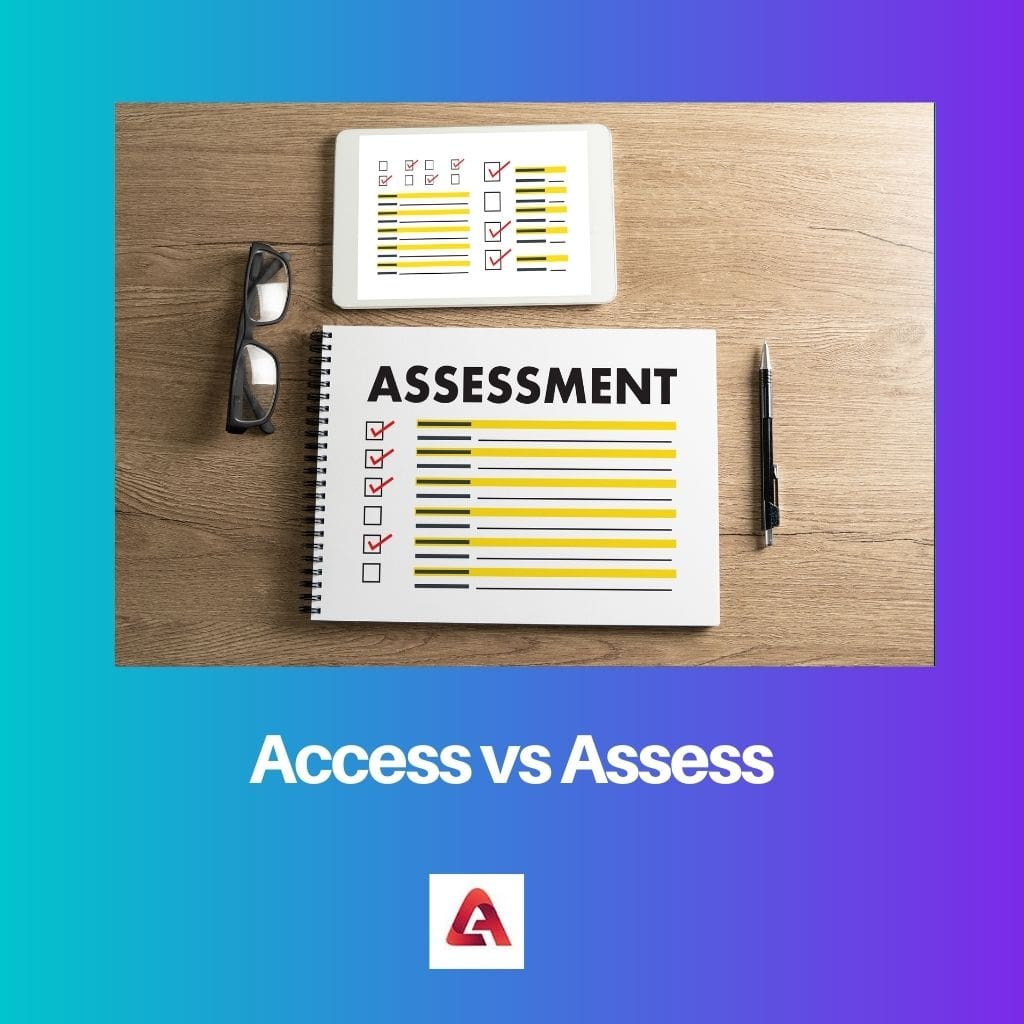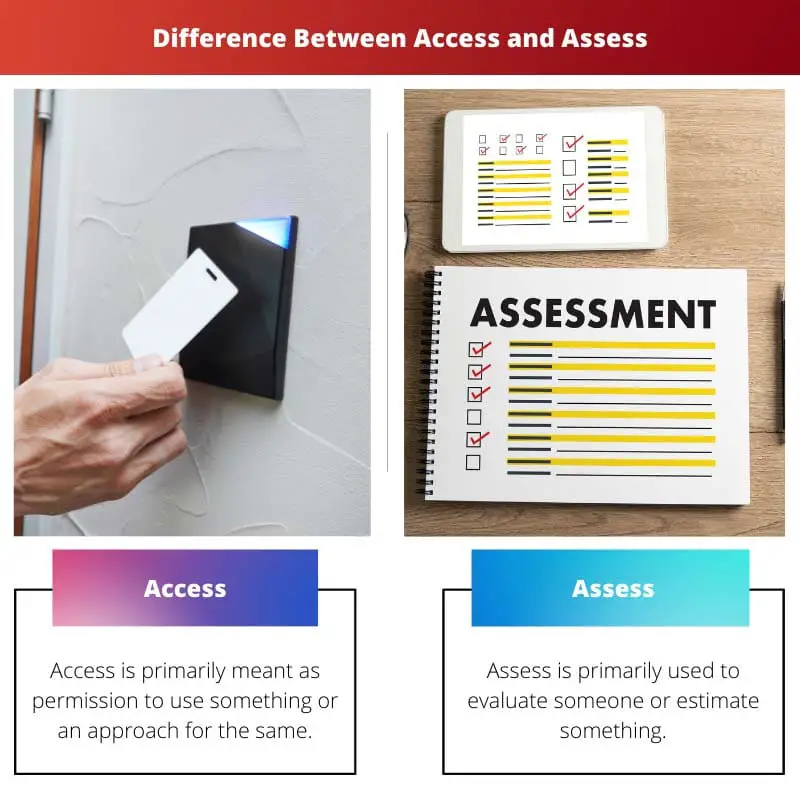“Access” refers to the ability to obtain or retrieve something, such as information, resources, or services. It implies the opportunity to utilize or interact with what is being accessed. “On the other hand, “assess” involves evaluating or analyzing something to determine its quality, value, or significance. It involves making judgments or forming opinions based on gathered information or criteria.
Key Takeaways
- Access means gaining entry, approaching, or using something; assess means evaluating or estimating the quality, value, or significance of something.
- Access is related to obtaining or using resources, while assessment is focused on judgment or measurement.
- Both words have different pronunciations, with “access” sounding like /ˈakˌses/ and “assess” like /əˈses/.
Access vs Assess
Access refers to the ability or right to use or obtain something, such as information or a resource, and can also refer to the act of gaining entry to a place or system. Assess means to evaluate or appraise something, and involves making a judgment based on careful consideration and analysis.

The word access is used in a sentence to depict the permission one has to use something.
Access can be used with any form of an object. Mostly the things in the sentences would be the one that has permission to be used and ultimately accessed. It also means the outbursts of emotions.
Assess is a term used to evaluate or estimate. It can have simultaneous meanings, like judging, valuing, and determining quality.
The object or the subject would be ’assessed ‘when this term is used in a sentence. It can also be used in places where the importance of something is spoken.
Comparison Table
| Feature | Access | Assess |
|---|---|---|
| Meaning | To gain entry to something | To evaluate something carefully |
| Function | Acquisition (obtaining the ability to use or experience something) | Evaluation (judging the quality, value, or condition of something) |
| Direction | Movement towards something (gaining access) | Movement from something (stepping back to evaluate) |
| Result | Ability to use or experience something (e.g., accessing a document) | Judgment or understanding (e.g., assessing a student’s knowledge) |
| Examples | * “You can access your files online.” * “Students can access the library after school.” * “The password grants you access to the system.” | * “The teacher assessed the students’ essays.” * “The doctor assessed the patient’s condition.” * “The company is assessing the potential risk of the project.” |
What is Access?
Understanding Access
Access, in its broadest sense, refers to the ability to approach, enter, make use of, or retrieve something. This concept spans various domains, including technology, information, resources, services, and physical spaces. Understanding access involves delving into its multifaceted nature and implications across different contexts.
Definition and Scope
Access encompasses the opportunity or right to utilize, interact with, or benefit from something. It implies the absence of barriers or restrictions that hinder entry or utilization. This could include gaining entry to a building, obtaining information from a database, utilizing public services, or tapping into digital resources. Access can be considered a fundamental aspect of equity and inclusivity, ensuring that individuals have the means to participate fully in society.
Types of Access
Access can manifest in different forms, each tailored to specific contexts:
- Physical Access: This refers to the ability to enter or navigate physical spaces, buildings, or facilities. It encompasses aspects such as infrastructure design, transportation systems, and accommodations for individuals with disabilities.
- Digital Access: In the digital realm, access pertains to the ability to connect to and interact with digital devices, networks, and online platforms. It involves considerations such as internet connectivity, device compatibility, and user interface design.
- Information Access: Information access involves the ability to obtain, retrieve, and utilize knowledge or data. It spans access to libraries, archives, databases, and online information sources. Ensuring equitable information access is crucial for promoting education, research, and informed decision-making.
- Resource Access: Resource access entails the availability and utilization of material or non-material resources essential for various activities. This could include access to healthcare, financial resources, educational opportunities, or employment prospects. Addressing disparities in resource access is vital for tackling socio-economic inequalities.
Importance and Challenges
Access plays a pivotal role in promoting equality, social justice, and human rights. It empowers individuals to participate in economic, educational, cultural, and political spheres. However, achieving universal access poses significant challenges, including infrastructural limitations, digital divides, regulatory barriers, and socio-economic disparities. Addressing these challenges requires concerted efforts from governments, organizations, and communities to implement inclusive policies, improve infrastructure, and foster digital literacy.

What is Assess?
Exploring Assessment
Assessment is a systematic process of evaluating, analyzing, and appraising something to gain insight, make informed decisions, or measure its quality, value, or significance. This comprehensive examination of assessment involves understanding its purpose, methods, and implications across different domains.
Definition and Purpose
Assessment involves the systematic gathering and analysis of information to make judgments, draw conclusions, or inform decision-making. Its purpose varies depending on the context and may include:
- Evaluation: Assessing the effectiveness, performance, or outcomes of individuals, systems, programs, or processes.
- Measurement: Quantifying attributes, characteristics, or outcomes to gauge progress, compare results, or establish benchmarks.
- Diagnosis: Identifying strengths, weaknesses, opportunities, or threats to inform interventions, improvements, or optimizations.
- Feedback: Providing individuals or entities with constructive feedback to enhance learning, performance, or effectiveness.
Types of Assessment
Assessment can take various forms, tailored to specific objectives, contexts, and stakeholders:
- Formative Assessment: Conducted during the learning process to provide feedback, guide instruction, and support ongoing improvement. It focuses on identifying areas for growth and facilitating learning experiences.
- Summative Assessment: Administered at the end of a learning period or program to evaluate performance, achievement, or mastery of specific goals or standards. It involves assigning grades, certifications, or other indicators of proficiency.
- Diagnostic Assessment: Implemented at the outset of a learning endeavor to identify prior knowledge, skills, or gaps in understanding. It informs instructional planning and customization to meet individual needs.
- Performance Assessment: Evaluates an individual’s ability to perform specific tasks, solve problems, or demonstrate skills in real-world contexts. It involves authentic tasks or simulations that reflect authentic challenges.
Importance and Challenges
Assessment serves crucial roles in education, healthcare, business, and various other domains. It provides stakeholders with valuable insights for decision-making, improvement, accountability, and validation. However, assessment poses challenges, including:
- Validity and Reliability: Ensuring that assessment methods accurately measure the intended constructs or outcomes reliably.
- Fairness and Equity: Addressing biases, cultural differences, or contextual factors that may influence assessment results or interpretations.
- Data Interpretation: Effectively interpreting assessment data to derive meaningful insights and actionable recommendations.
- Ethical Considerations: Upholding ethical standards and privacy protections when collecting, analyzing, or using assessment data.

Main Differences Between Access and Assess
- Access:
- Refers to the ability to obtain, retrieve, or utilize something.
- Involves gaining entry, interaction, or utilization of resources, services, or information.
- Focuses on availability, opportunity, and the absence of barriers or restrictions.
- Examples include accessing a building, database, digital platform, or educational resource.
- Assess:
- Involves evaluating, analyzing, or appraising something to gain insight or make judgments.
- Focuses on understanding quality, value, significance, or performance.
- Includes methods such as evaluation, measurement, diagnosis, or feedback.
- Examples include assessing student performance, program effectiveness, or business strategies.




